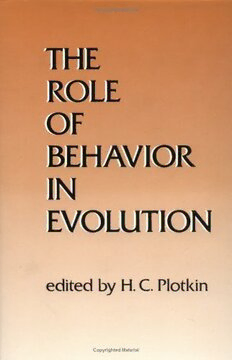
The Role of behavior in evolution PDF
01988·0.579 MB·English
Most books are stored in the elastic cloud where traffic is expensive. For this reason, we have a limit on daily download.
Preview The Role of behavior in evolution
Description:
These six original essays focus on a potentially important aspect of evolutionary biology, the possible causal role of phenotypic behavior in evolution. Balancing theory with actual or potential empiricism, they provide the first full examination of this topic. Plotkin's opening chapter outlines the "conceptual minefields" that the contributors attempt to negotiate: What is an adequate theory of evolution? What is behavior and is it possible to maintain a distinction between behavior and other attributes of the phenotype? is all, or only a special subset, of behavior both a cause and a consequence of evolution? And what do the theoretical issues mean in empirical terms? He concludes that any attempt to understand the causal role of behavior in evolution requires a more complicated theoretical structure than that of orthodox neoDarwinism, a conceptualization of behavior as a distinctive set of phenotypic attributes, and the accumulation of more data. David L. Hull (Northwestern University) provides an alternative account of the evolutionary process by developing a hierarchy of replicators-interactors-lineages to replace the traditional one of genes-organisms-species. Robert N. Brandon (Duke University) also posits hierarchy as an appropriate architecture for the theoretical complexity needed to support an examination of the role of behavior in evolution. F. J. Odling-Smee (Brunei University) outlines a theoretical structure to encompass the behavior of phenotypes, concentrating on the unrestricted definition of behavior (everything that an animal does). The remaining chapters are as much concerned with evidence as with theory. Plotkin concentrates on a restricted definition of behavior (behavior that is a product of choosing intelligence), reviewing our empirical knowledge of how learning might influence evolution. R.I.M. Dunbar (University College, London) uses empirical studies of vertebrate social behavior to deal with the question of how the social systems, especially of primates, might have a causal role in species evolution. Henry C. Plotkin is Lecturer at the University College, London. A Bradford Book.
See more
The list of books you might like
Most books are stored in the elastic cloud where traffic is expensive. For this reason, we have a limit on daily download.
